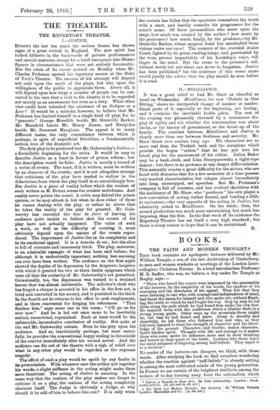THE THEATRE.
THE REPERTORY THEATRE.
DURING the last ten years the serious drama has shown signs of a great revival in England. The new spirit has lurked hitherto in the backwoods of private performances and special matinees, except for a brief emergence into Sloane Square in circumstances that were not entirely favourable. But the crisis of its career arrived on Monday when Mr. Charles Frohman opened his repertory season at the Duke of York's Theatre. The success of his attempt will depend not only upon the merit of the plays, but also upon the willingness of the public to appreciate them. Above all, it will depend upon how large a number of people can be con- verted to the view that a visit to the theatre is to be regarded not merely as an amusement but even as a duty. What other view could have tolerated the existence of an Oedipus or a Lear ? it would be a mistake, however, to believe that Mr. Frohman has limited himself to a single kind of play, for he " presents " George Meredith beside Mr. Granville Barker, Mr. Masefield beside Mr. Henry Tames, and Euripides beside fr. Somerset Maugham. The appeal is to many different tastes, the only resemblance between which is perhaps, in spite of superficial frivolities, a fundamentally serious love of the dramatic art.
The first play to be produced was Mr. Galsworthfs Justice, — a formidable beginning for the series. It would be easy to describe justice as a tract in favour of prison reform ; but the description would be false. Justice is merely a record of a series of events. The tract, if it is written, must be written by an observer of the events; and it is not altogether strange that criticisms of the play have tended to wallow in the didacticism from which the play itself is so astonishingly free. For Justice is a piece of reality before which the realism of such writers as M. Brieux seems the crudest melodrama. And reality never points the moraL A critic may defend the prison system, or he may attack it, but when he does either of these he ceases dealing with the play, or rather he shows that he takes the reality of the play for granted. Mr. Gals- worthy has executed the• tour de force of leaving his audience quite unable to believe that the events of his play have not actually happened. The value of such a work, as well as the difficulty of creating it, must obviously depend upon the nature of the events repro- duced. The importance of Justice lies in its complexity and in its emotional a,ppeaL It is a treachs de vie ; but the slice is full of currants and immensely thick. The play, moreover, is an admirable example, of what has been said before; for although it is undoubtedly important, nothing less amusing can ever have been written. The audience on the first night showed the depths of its depression by the desperate laughter with which it greeted the two or three feeble epigrams which were all that the austerity of Mr. Galsworthy's art permitted. Occasionally, too., the depression was turned to a strained horror that was ahnost intolerable. The solicitor's clerk who has forged a cheque is arrested in his office in the first act, is tried and convicted in the second, and is punished in the third. In the fourth act he returns to his office to seek employment, sad is there rearrested for forging his references. "That finishes him," says some one in the room ; "it'll go on for ever now." And he is led out once more to be inevitably retried, reconvicted,, repunished. Such at least would be the unbearable, inconclusive conclusion of reality. But quite at
the end Mr. Galsworthy relents. Even he has pity upon his audience. And so, inartistically perhaps, but most merci- fully, he provides the conventional happy ending in the suicide of the convict immediately after his second arrest. And the audience can file out at the theatre with a sigh of relief over what in any other play would be regarded as the supreme tragedy.
The effect of such a play would-be spoilt by any faults in its presentation. With whatever care the author put together his -words, a slight stiffness in the acting might make them seeni theatrical. The acting of justice is amazing. In the same way that the realism. of the play makes one forget to criticise it as a play, the realism of the actiugl completely obscures itself.. The Judge is ehviously a judge, so why should it be odd of him to behave like one ? it is only when the curtain has fallen that the spectator remembers the truth with a start, and hastily consults his programme for the actor's name. Of these personalities who move upon the stage, how much was created by the author ? how much by the performer ? how much, finally, by the produoer,—by Mr. Granville Barker, whose magical hand has .marshalled these visions under our eyes ? The memory of the .crowded Assize Court, lighted by its green reading-lamps, and „penetrated by the even, precise impartiality of his LozdalaiVa voice, will linger in the mind. But the scene in the ,prisoner's cell, without words but not silent, can never be.forgektert. Justice has been published,* but the existence of this scene alone would justify the advice that the play.should be seen before it is read.










































 Previous page
Previous page